(完整版)小学一般将来时讲解
- 格式:doc
- 大小:30.01 KB
- 文档页数:4
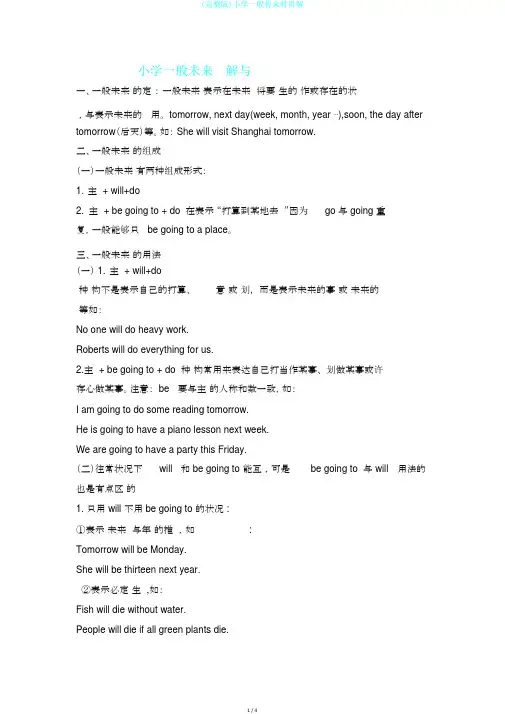
小学一般未来解与一、一般未来的定:一般未来表示在未来将要生的作或存在的状,与表示未来的用。
tomorrow, next day(week, month, year ⋯),soon, the day after tomorrow(后天)等。
如: She will visit Shanghai tomorrow.二、一般未来的组成(一)一般未来有两种组成形式:1.主 + will+do2.主 + be going to + do 在表示“打算到某地去”因为 go 与 going 重复,一般能够只 be going to a place。
三、一般未来的用法(一) 1.主 + will+do种构不是表示自己的打算、意或划,而是表示未来的事或未来的等如:No one will do heavy work.Roberts will do everything for us.2.主 + be going to + do 种构常用来表达自己打当作某事、划做某事或许存心做某事。
注意: be 要与主的人称和数一致,如:I am going to do some reading tomorrow.He is going to have a piano lesson next week.We are going to have a party this Friday.(二)往常状况下will和be going to能互,可是be going to 与 will用法的也是有点区的1. 只用 will 不用 be going to 的状况 :①表示未来与年的推,如:Tomorrow will be Monday.She will be thirteen next year.②表示必定生 ,如:Fish will die without water.People will die if all green plants die.2.只用 be going to 而不用 will 的状况:假如表示已有迹象表示在不久的未来要发生的事情时,如:Look at those black clouds, It’ s going to rain.(三)某些动词如: go/come/leave/start/begin/arrive等,它们的此刻进行时能够表示未来时,如:They are leaving for Shanghaitomorrow.My brother is coming here soon.四、一般未来时的句式变换一定句:主语 + will+do主语 + be going to + do否认句:主语 + will+not+do (will not可缩写成won’t)主语 + be+ not+ going to +do一般疑问句:will+ 主语 + dobe+主语 +going to+do特别疑问句:疑问词 + will+ 主语 +do疑问词 +be+主语 +going to+do五.稳固练习一、按要求填空1.我打算明日和朋友去野炊。
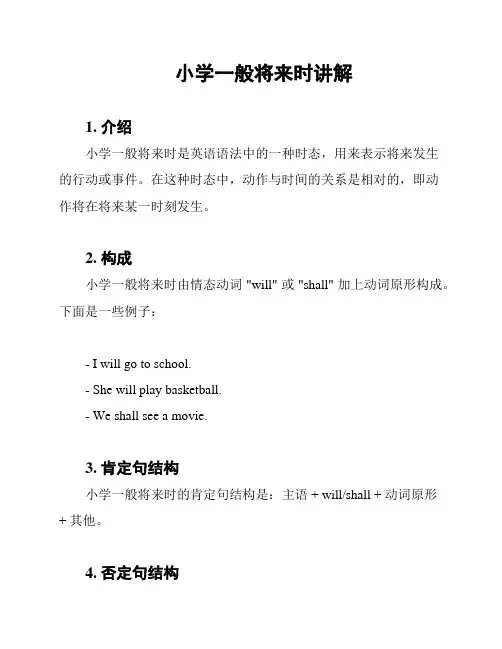
小学一般将来时讲解1. 介绍小学一般将来时是英语语法中的一种时态,用来表示将来发生的行动或事件。
在这种时态中,动作与时间的关系是相对的,即动作将在将来某一时刻发生。
2. 构成小学一般将来时由情态动词 "will" 或 "shall" 加上动词原形构成。
下面是一些例子:- I will go to school.- She will play basketball.- We shall see a movie.3. 肯定句结构小学一般将来时的肯定句结构是:主语 + will/shall + 动词原形+ 其他。
4. 否定句结构小学一般将来时的否定句结构是:主语 + will/shall + not + 动词原形 + 其他。
5. 疑问句结构小学一般将来时的疑问句结构是:Will/Shall + 主语 + 动词原形+ 其他?6. 使用场景小学一般将来时常用于以下场景:- 表示未来的计划或打算:I will go to the park tomorrow.- 表示预测:It will rain later.- 表示意愿或请求:Will you help me with my homework?7. 注意事项在小学一般将来时中,我们要注意以下几点:- 不使用"will"或"shall"来表达对他人的承诺或决定,如"I promise"或"I decide"。
- 在口语中,经常使用"will"而不是"shall"。
- 在第一人称疑问句中,我们可以使用"shall"代替"will",但这并不常见。
希望这份文档对你的小学一般将来时的学习有所帮助!。
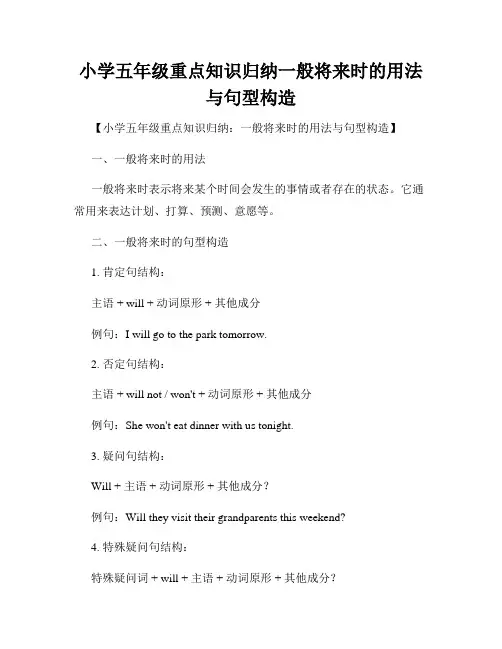
小学五年级重点知识归纳一般将来时的用法与句型构造【小学五年级重点知识归纳:一般将来时的用法与句型构造】一、一般将来时的用法一般将来时表示将来某个时间会发生的事情或者存在的状态。
它通常用来表达计划、打算、预测、意愿等。
二、一般将来时的句型构造1. 肯定句结构:主语 + will + 动词原形 + 其他成分例句:I will go to the park tomorrow.2. 否定句结构:主语 + will not / won't + 动词原形 + 其他成分例句:She won't eat dinner with us tonight.3. 疑问句结构:Will + 主语 + 动词原形 + 其他成分?例句:Will they visit their grandparents this weekend?4. 特殊疑问句结构:特殊疑问词 + will + 主语 + 动词原形 + 其他成分?例句:Where will you go on your vacation?三、一般将来时的常见时间状语1. tomorrow(明天)2. next week(下周)3. in the future(将来)4. soon(很快)5. in a year(一年后)等等四、一般将来时的其他用法1. 表示预测或推测的句子,常使用的词汇有:think,believe,hope,expect等。
例句:I think it will rain later.我认为一会儿会下雨。
2. 表示意愿、请求、建议等情态动词的用法。
例句:I will help you with your homework.我会帮你写作业。
五、一般将来时使用注意事项1. 在一般将来时中,主语为第三人称单数时,动词要加上“s”或者“es”。
例句:He will playsoccer with his friends tomorrow.2. 一些动词在一般将来时的变化形式是不规则的,需要特别注意。
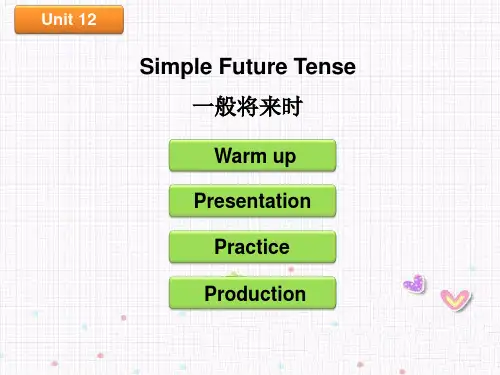
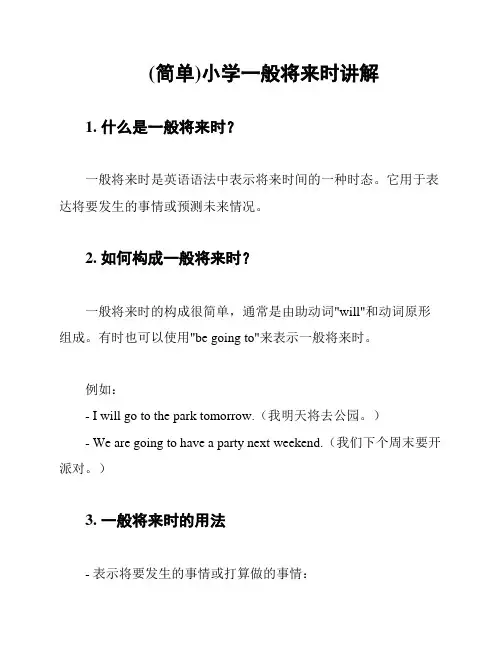
(简单)小学一般将来时讲解1. 什么是一般将来时?一般将来时是英语语法中表示将来时间的一种时态。
它用于表达将要发生的事情或预测未来情况。
2. 如何构成一般将来时?一般将来时的构成很简单,通常是由助动词"will"和动词原形组成。
有时也可以使用"be going to"来表示一般将来时。
例如:- I will go to the park tomorrow.(我明天将去公园。
)- We are going to have a party next weekend.(我们下个周末要开派对。
)3. 一般将来时的用法- 表示将要发生的事情或打算做的事情:- I will call you later.(我等会儿给你打电话。
)- They will have a meeting tomorrow.(他们明天要开会。
)- 表示预测或猜测未来情况:- It will rain this afternoon.(今天下午会下雨。
)- She will probably pass the exam.(她很可能会通过考试。
)- 用于表示意愿、请求、建议、命令等:- Will you help me with my homework, please?(请你帮我做作业好吗?)- You will do as I say.(你要按我说的去做。
)4. 注意事项- 一般将来时通常不能与表示明确的时间状语连用,如"tomorrow"、"next week"等。
- 在第一人称中,可以使用"shall"代替"will",但这在现代英语中很少使用。
- 使用"be going to"时,一般是根据现有迹象进行预测或计划。
5. 例句- She will study abroad next year.(她明年将出国留学。
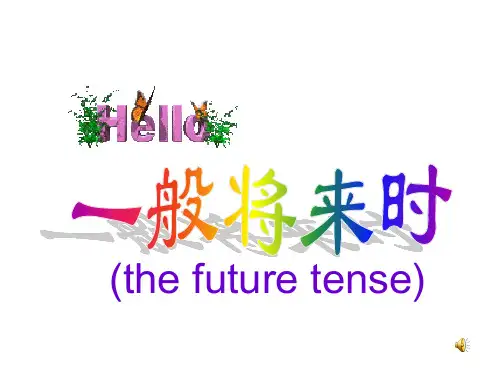
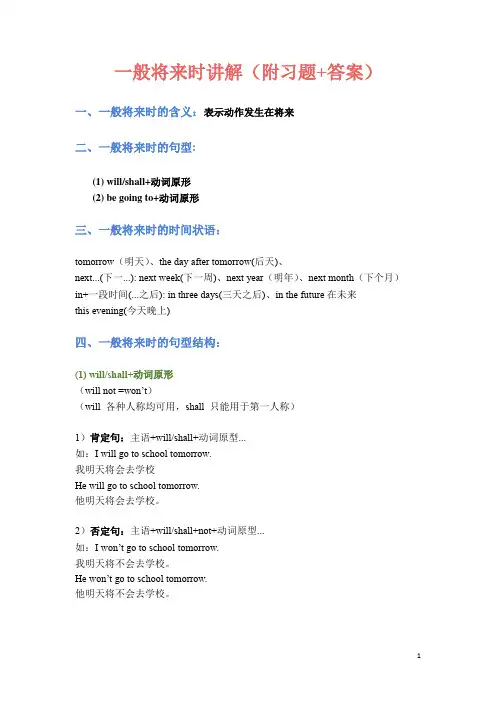
一般将来时讲解(附习题+答案)一、一般将来时的含义:表示动作发生在将来二、一般将来时的句型:(1) will/shall+动词原形(2) be going to+动词原形三、一般将来时的时间状语:tomorrow(明天)、the day after tomorrow(后天)、next...(下一...): next week(下一周)、next year(明年)、next month(下个月)in+一段时间(...之后): in three days(三天之后)、in the future在未来this evening(今天晚上)四、一般将来时的句型结构:(1) will/shall+动词原形(will not =won’t)(will 各种人称均可用,shall 只能用于第一人称)1)肯定句:主语+will/shall+动词原型...如:I will go to school tomorrow.我明天将会去学校He will go to school tomorrow.他明天将会去学校。
2)否定句:主语+will/shall+not+动词原型...如:I won’t go to school tomorrow.我明天将不会去学校。
He won’t go to school tomorrow.他明天将不会去学校。
3)一般疑问句:Will/Shall +主语+动词原型...如:Will you go to school tomorrow?你明天要去学校吗?Will he go to school tomorrow?他明天要去学校吗?肯定回答:Yes, 主语+will.如:Yes, I will.Yes, he will.否定回答:No,主语+will+not.如:No, I won’t.No, he won’t.4) 特殊疑问句:特殊疑问词+will/shall+主语+动词原型...如:What will you do tomorrow?你明天将会做什么?What will he do tomorrow?他明天将会做什么?(2) be going to+动词原形1)肯定句:主语+be going to +动词原型...如:I am going to buy some books tomorrow.我明天打算去买一些书。
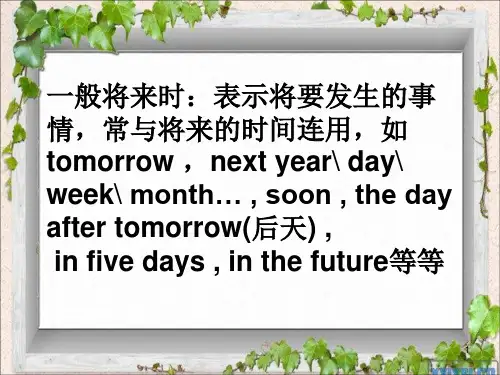

英语一年级一般将来时的介绍
一般将来时是一年级英语的语法,对于一般将来时大家了解有多少呢?下面就是小编为大家整理的一般将来时的介绍,希望对大家有所帮助!
一般将来时主要用于
表示将要发生的动作或情况
e.g. Tom will have a bike of his own.
与这个时态连用的时间状语常用:
tonight,tomorrow,the day after tomorrow,next week,in three hours,two days later 等。
一般将来时态与其它结构表将来情况的区别
一般将来时态:主要从时间的角度表将要发生的动作或情况。
be going to 结构:①表(主观上)打算或准备做某事时。
②表有发生某事的预兆时。
e.g. They are going to have a competition with us in studies. It is going to rain.
据以上区别,故下面一句是错的:
I am going to be eighteen years old next year.
应改为: I shall be eighteen years old next year.
be about to do sth 结构:意为“刚要做某事”、“马上要做某事”强调时间之紧迫性。
e.g. We are about to discuss this problem.。
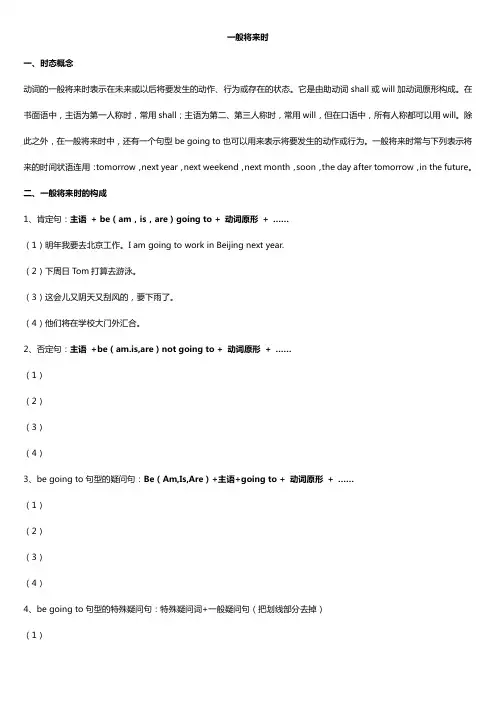
一般将来时一、时态概念动词的一般将来时表示在未来或以后将要发生的动作、行为或存在的状态。
它是由助动词shall或will加动词原形构成。
在书面语中,主语为第一人称时,常用shall;主语为第二、第三人称时,常用will,但在口语中,所有人称都可以用will。
除此之外,在一般将来时中,还有一个句型be going to也可以用来表示将要发生的动作或行为。
一般将来时常与下列表示将来的时间状语连用:tomorrow,next year,next weekend,next month,soon,the day after tomorrow,in the future。
二、一般将来时的构成1、肯定句:主语+ be(am,is,are)going to + 动词原形+ ……(1)明年我要去北京工作。
I am going to work in Beijing next year.(2)下周日Tom打算去游泳。
(3)这会儿又阴天又刮风的,要下雨了。
(4)他们将在学校大门外汇合。
2、否定句:主语+be(am.is,are)not going to + 动词原形+ ……(1)(2)(3)(4)3、be going to句型的疑问句:Be(Am,Is,Are)+主语+going to + 动词原形+ ……(1)(2)(3)(4)4、be going to句型的特殊疑问句:特殊疑问词+一般疑问句(把划线部分去掉)(1)(2)(4)练一练吧:一、用所给动词的适当形式填空1.Jim and Li Lei ________________________(watch)the football match this evening.2.__________ she ________________________(have)a Chinese lesson tomorrow?3.—What __________ you _________________________(do)tomorrow morning?—I _____________________(see)my grandparents.4.__________ they_______________(go)fishing this Friday afternoon?5.There _________________________(be)a birthday party this evening.二、按要求改写下列各句1.They are going to play ping-pong on Saturday.(改为一般疑问句并作否定回答)—__________ __________ going to play ping-pong on Saturday?—__________,________________.2.He's going to tell me a story.(改为否定句)He __________ __________ going to tell me a story.3.She is going to work hard at English this term.(对划线部分提问)__________ she __________ __________ __________ this term?4.They're going to the Sun Island by bus.(对划线部分提问)__________ __________ they __________ __________ the Sun Island?5.The students of Class Three have a field trip on Sunday.(用next Sunday改写)The students of Class Three __________ __________ __________ __________ a field trip next Sunday.6.Linda has lunch at school on Tuesdays.(用next Tuesday改写)Linda __________ __________ __________ __________ lunch at school next Tuesday.。

一般将来时的结构和用法及讲解一般将来时是英语中用来表示将来发生的动作或状态的一种时态。
它通常由助动词"will"或"shall"和动词的原形构成。
以下是关于一般将来时的结构和用法的详细讲解:1. 结构:主语 + will/shall + 动词原形+ …。
2. 肯定句的结构:主语 + will/shall + 动词原形 + 其他成分(宾语、状语等)。
3. 否定句的结构:主语 + will not (won't) / shall not (shan't) + 动词原形 + 其他成分。
4. 疑问句的结构:Will/Shall + 主语 + 动词原形 + 其他成分?5. 用法:a. 表示未来的事实、计划或意图,例如,“I will call you later.”(我稍后会给你打电话。
)。
b. 表示预测或假设,例如,“It will rain tomorrow.”(明天会下雨。
)。
c. 表示意愿、请求或承诺,例如,“I will help you with your homework.”(我会帮你做作业。
)。
d. 表示决定,例如,“I will buy a new car.”(我决定买辆新车。
)。
一般将来时的用法相对灵活,可以根据语境和需要进行灵活运用。
需要注意的是,一般将来时中的助动词"will"在口语中常缩写为"‘ll",而否定形式则缩写为"won't"。
同时,在一般将来时中,shall通常用于第一人称(I 和 we),而will则用于其他人称。
在现代英语中,shall的使用已经相对较少,通常用will来表示一般将来时。
完整版)小学英语一般将来时讲解及练习XXX: XXX XXXThe simple XXX future。
and it is used with time XXX。
next day/week/month/year。
soon。
and the day after tomorrow。
For example。
"She will visit XXX."There are two forms of the simple future XXX:1.Subject + shall/will + verb2.Subject + be going to + verbXXX to go to a place。
it is common to use "be going to a place" instead of repeating the verb "go."XXX simple future XXX can be used in the following ways:1.(1) Subject + shall/will + verb (will can be used for all persons。
while shall is only used for the first person singular and plural) is not used to express one's own plans or ns。
but rather tostate XXX。
such as "No one will do heavy work" and "Roberts will do everything for us."2) Subject + be going to + verb is often used to express one's own plans。
一般将来时1.一般将来时的基本概念一般将来时表示将来某一时刻的动作或状态,或将来某一段时间内经常的动作或状态。
一般将来时由助动词shall(第一人称),will(第二、三人称)+动词原形构成。
美国英语则不管什么人称,一律用will.2.一般将来时的形式●will 常简略为 'll,并与主语连写在一起,如:I’ll,he'll,it'll,we’ll,you'll,they’ll。
●一般疑问句如用will you…?其简略答语须是Yes,I will或 No,I will not;如用 Shall you…?(较少见)其简略答语须是 Yes,I shall.或 No, I shall not.。
3.一般将来时的用法1)表示将来的动作或状态一般将来时常与一些表示将来的时间状语连用,如:tomorrow(明天), next week(下周), from now on(从现在开始);in the future(将来)等.2)表示将来经常发生的动作。
4.一般将来时的其他用法一般将来时表示将来某一时刻的动作或状态,其表达形式除了“shall(第一人称),will(第二、三人称)+动词原形构成”外,还有以下几种形式.1)“to be going to+动词原形”表示即将发生的或最近打算进行的事.例如:①It is going to rain。
要下雨了。
②We are going to have a meeting today. 今天我们开会。
2)go, come,start,move,sail,leave,arrive,stay等可用进行时态表示按计划即将发生的动作,例如:I'm leaving for Beijing。
我要去北京.3)“be to+动词原形”表示按计划要发生的事或征求对方意见。
例如:①Are we to go on with this work?我们继续干吗?②The boy is to go to school tomorrow.这个男孩明天要去上学。
1、概述一般将来时表示将来某个时间要发生的动作或存在的状态,常与表示将来的时间状语连用,如tomorrow,next week,next year等。
Why don’t you put the meat in the fridge? It will stay fresh for several days.为什么不把肉放在冰箱里?它可以保鲜好几天。
—You’ve left the light on。
你忘了关灯了。
- Oh , so I have。
I'll go and turn it off。
噢,那我马上去关.2、构成一般将来时由“助动词will/shall+动词原形”构成。
will用于第二、三人称,shall第一人称。
在口语中,will在名词或代词后常缩写为’ll,will not简缩为won’t[wount]。
但在美国英语中,各种人称皆可用will。
He will help his sister with her lessons。
他将帮助他妹妹做功课.We won’t be free this afternoon.今天下午我们没空。
3、一般将来时的用法(1)表示未来的动作或存在状态,常与表示将来的时间状语连用,如tomorrow, next Sunday, soon,in a month, in the future等。
We shall leave for London next Monday.我们将在下周一去伦敦。
He will come to see you the day after tomorrow.后天他要来看你。
You will be 20 next year。
明年你就二十了。
(2)表示将来反复发生的动作或习惯性动作We shall come and work in this factory every year.我们将每年来这工厂参加劳动。
The students will have five English classes per week this term.本学期学生每周将要上五节英语课。
小学一般将来时讲解 Company number【1089WT-1898YT-1W8CB-9UUT-92108】小学一般将来时讲解与练习一、一般将来时的定义:一般将来时表示在将来时间将要发生的动作或存在的状态,与表示将来的时间连用。
tomorrow, next day(week, month, year…),soon, the day after tomorrow(后天)等。
如:She will visit Shanghai tomorrow.二、一般将来时的构成(一)一般将来时有两种构成形式:1.主语+shall/will+do2. 主语+ be going to + do 在表示“打算到某地去时”由于谓语动词go与going重复,一般可以只说be going to a place。
三、一般将来时的用法(一)1.主语+shall/will+do (will可用于所有人称,shall只用于第一人称I和we) 这种结构不是表示自己的打算、意图或计划,而是表示未来的事实或对将来的预测等如:No one will do heavy work.Roberts will do everything for us.2.主语+ be going to + do这种结构常用来表达自己打算做某事、计划做某事或者有意做某事。
注意:be 动词要与主语的人称和数一致,如:I am going to do some reading tomorrow.He is going to have a piano lesson next week.We are going to have a party this Friday.(二)通常情况下will 和 be going to能互换,但是be going to 与will 用法的也是有点区别的1. 只用will不用be going to的情况:①表示对未来时间与年龄的推测时,如:Tomorrow will be Monday.She will be thirteen next year.②表示必然发生时,如:Fish will die without water.People will die if all green plants die.2.只用be going to而不用will的情况:如果表示已有迹象表明在不久的将来要发生的事情时,如:Look at those black clouds, It’s going to rain.(三)某些动词如:go/come/leave/start/begin/arrive等,它们的现在进行时可以表示将来时,如:They are leaving for Shanghaitomorrow.My brother is coming here soon.四、一般将来时的句式变换肯定句:主语+shall/will+do主语+ be going to + do否定句:主语+shall/will+not+do(will not 可缩写成won’t)主语+ be+ not+ going to +do一般疑问句:shall/will+主语+ dobe+主语+going to+do特殊疑问句:疑问词+ shall/will+主语+do疑问词+be+主语+going to+do五.巩固练习一、按要求填空1. 我打算明天和朋友去野炊。
小学一般将来时讲解与练习
一、一般将来时的定义:一般将来时表示在将来时间将要发生的动作或存在的状态,与表示将来的时间连用。
tomorrow, next day(week, month, year…),soon, the day after tomorrow(后天)等。
如:She will visit Shanghai tomorrow.
二、一般将来时的构成
(一)一般将来时有两种构成形式:
1.主语+ will+do
2. 主语+ be going to + do 在表示“打算到某地去时”由于谓语动词go与going重复,一般可以只说be going to a place。
三、一般将来时的用法
(一)1.主语+ will+do
这种结构不是表示自己的打算、意图或计划,而是表示未来的事实或对将来的预测等如:
No one will do heavy work.
Roberts will do everything for us.
2.主语+ be going to + do这种结构常用来表达自己打算做某事、计划做某事或者有意做某事。
注意:be 动词要与主语的人称和数一致,如:
I am going to do some reading tomorrow.
He is going to have a piano lesson next week.
We are going to have a party this Friday.
(二)通常情况下will 和be going to能互换,但是be going to 与will 用法的也是有点区别的
1. 只用will不用be going to的情况:
①表示对未来时间与年龄的推测时,如:
Tomorrow will be Monday.
She will be thirteen next year.
②表示必然发生时,如:
Fish will die without water.
People will die if all green plants die.
2.只用be going to而不用will的情况:
如果表示已有迹象表明在不久的将来要发生的事情时,如:
Look at those black clouds, It’s going to rain.
(三)某些动词如:go/come/leave/start/begin/arrive等,它们的现在进行时可以表示将来时,如:
They are leaving for Shanghaitomorrow.
My brother is coming here soon.
四、一般将来时的句式变换
肯定句:主语+ will+do
主语+ be going to + do
否定句:主语+ will+not+do(will not 可缩写成won’t)
主语+ be+ not+ going to +do
一般疑问句:will+主语+ do
be+主语+going to+do
特殊疑问句:疑问词+ will+主语+do
疑问词+be+主语+going to+do
五.巩固练习
一、按要求填空
1. 我打算明天和朋友去野炊。
I_____ _______ _________ have a picnic with my friends.
I ________ have a picnic with my friends.
2. 下个星期一你打算去干嘛? 我想去打篮球。
What ________ ________ _________ _________ _________ next Monday?
I _______ ______ _____ play basketball. What _________ you do next Monday?
I ________ play basketball.
3. 你妈妈这个周末去购物吗?是,她要去买一些水果。
_____ your mother _______ ________ go shopping this ___________? Yes, she _________. She ______ ________ __________ buy some fruit.
4. 你们打算什么时候见面。
What time _______ you _________ __________ meet?
二、改句子。
5. Nancy is going to go camping.(改否定)
Nancy ________ going to go camping.
6. I’ll go and join them.(改否定)
I _______ go ______ join them.
7. I’m going to get up at 6:30 tomorrow.(改一般疑问句)
________ _______ ________ to get up at 6:30 tomorrow?
8. We will meet at the bus stop at 10:30.(改一般疑问句)
_______ ________ meet at the bus stop at 10:30.
9. She is going to listen to music after school.(对划线部分提问)
________ _______ she ________ ________ _________ after school?
10. My father and mother are going to see a play the day after tomorrow.(同上) _________ _________ going to see a play the day after tomorrow.
三、用所给词的适当形式填空。
11. Today is a sunny day. We ___________________ (have) a picnic this afternoon.
12. My brother _______________ (go) to Shanghai next week.
13. Tom often ______________(go) to school on foot. But today is rain. He ______________ (go) to school by bike.
14. What do you usually do at weekends? I usually ________ (watch) TV and ________(catch) insects?
15. It’s Friday today. What _____she _________ (do) this weekend? She ______________ (watch) TV and _____________ (catch) insects.
16. What ___________ (d0) you do last Sunday? I ____________ (pick) apples on a farm.
What ______________ (do) next Sunday? I ______________ (milk) cows.
17. Mary ____________ (visit) her grandparents tomorrow.
18. Liu Tao ____________ (fly) kites in the playground yesterday.
19. David ______________ (give) a puppet show next Monday.
20. I ________________ (plan) for my study now.。